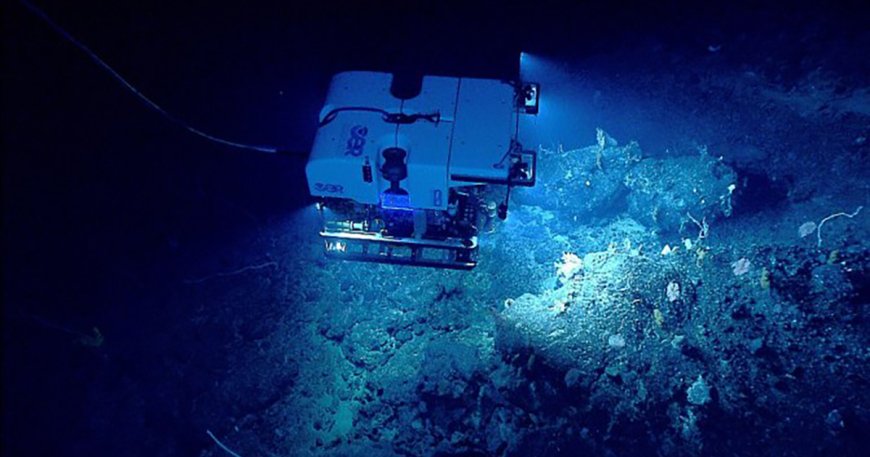Deep-Sea Mining: The High-Stakes Battle Over Ocean Resources
Deep-sea mining could provide critical minerals for clean energy but threatens marine ecosystems. Discover the debate over extracting ocean resources.

Introduction
Beneath the vast, uncharted depths of our oceans lies a hidden treasure trove—rich deposits of minerals like nickel, cobalt, and rare earth elements. These resources are essential for modern technologies, from smartphones and electric vehicle (EV) batteries to renewable energy systems. But there’s a catch. Extracting these materials through deep-sea mining comes at a steep cost—potentially disrupting fragile marine ecosystems and threatening biodiversity.
As the demand for these metals surges, companies and nations are racing to stake their claims on the ocean floor. But environmentalists and scientists warn that this rush could unleash irreversible ecological damage. So, should we tap into this vast undersea wealth, or is the risk too high? Let’s explore both sides of the deep-sea mining debate.
What is Deep-Sea Mining?
Deep-sea mining refers to the extraction of minerals from the seabed at depths of 200 meters to over 6,500 meters. These operations target three primary types of mineral deposits:
-
Polymetallic Nodules – Rock-like formations on the ocean floor rich in nickel, cobalt, manganese, and copper.
-
Seafloor Massive Sulfides (SMSs) – Found near hydrothermal vents, these contain high concentrations of gold, silver, zinc, and copper.
-
Cobalt-Rich Crusts – These crusts form on underwater mountains and contain cobalt, rare earth elements, and platinum.
To access these minerals, mining companies deploy robotic machines to scrape, drill, or vacuum the ocean floor, sending extracted materials to the surface. While this sounds like an engineering marvel, it also raises serious concerns about marine conservation.
The Case for Deep-Sea Mining
Advocates argue that deep-sea mining is necessary for a sustainable future, especially in the clean energy sector. Here’s why:
1. Meeting the Demand for Critical Minerals
The world’s transition to electric vehicles, wind turbines, and solar panels depends on metals like cobalt, lithium, and rare earth elements. As terrestrial mines struggle to meet demand, deep-sea mining could provide a new, more abundant source of these essential materials.
2. Reducing Dependence on Land-Based Mining
Traditional mining is notorious for deforestation, water pollution, and human rights violations. Advocates claim that deep-sea mining offers a less disruptive alternative, with no forced displacements or large-scale deforestation.
3. Economic & Geopolitical Benefits
Many nations, particularly island states and resource-poor countries, see deep-sea mining as a chance to boost their economies. The race for deep-sea resources could also reduce reliance on China, which currently dominates the global supply chain for rare earth metals.
The Case Against Deep-Sea Mining
Despite its economic promise, deep-sea mining has ignited fierce opposition from marine biologists, conservationists, and environmental organizations. Here’s why critics are pushing back:
1. Irreversible Damage to Marine Ecosystems
The deep sea is one of the most mysterious and least explored habitats on Earth, home to unique species that have adapted to extreme conditions. Mining operations could:
✔ Disrupt fragile ecosystems that take thousands of years to form.
✔ Destroy habitats of deep-sea creatures, many of which remain undiscovered.
✔ Generate sediment plumes—clouds of fine particles that could smother marine life and disrupt food chains.
2. Carbon Sequestration Disruption
The deep ocean stores massive amounts of carbon in its sediments. Mining could release this stored carbon, contributing to climate change and undermining global carbon reduction efforts.
3. Lack of Regulatory Oversight
Currently, no universal legal framework governs deep-sea mining. The International Seabed Authority (ISA), the UN-affiliated body responsible for regulating seabed mining, has yet to finalize mining regulations. Critics argue that mining could start before proper environmental protections are in place.
4. Alternatives Exist
Instead of mining untouched ecosystems, researchers suggest:
✔ Urban mining—extracting metals from electronic waste.
✔ Improving recycling systems to recover more critical minerals.
✔ Investing in sustainable land-based mining technologies.
Who’s Leading the Race?
Several nations and corporations are actively exploring deep-sea mining:
-
The Metals Company (TMC) – A Canadian firm conducting trials in the Pacific’s Clarion-Clipperton Zone.
-
China – A dominant player, with multiple exploration contracts under ISA regulations.
-
Norway – The first country to approve commercial deep-sea mining in its waters.
-
Pacific Island Nations – Nauru and Tonga have partnered with companies seeking to mine polymetallic nodules.
On the other side, nations like Germany, France, and New Zealand have called for a moratorium until more research is conducted.
The Future of Deep-Sea Mining: What’s Next?
The future of deep-sea mining hinges on a delicate balance between economic needs and environmental responsibility. As debates intensify, several key questions remain unanswered:
✔ Can technology be developed to mine responsibly without harming ecosystems?
✔ Will stronger global regulations emerge to ensure sustainable practices?
✔ Should we delay deep-sea mining in favor of alternative sources for critical minerals?
For now, the world watches and waits, as the fight over Earth’s last unmined frontier unfolds.
What's Your Reaction?
 Like
0
Like
0
 Dislike
0
Dislike
0
 Love
0
Love
0
 Funny
0
Funny
0
 Angry
0
Angry
0
 Sad
0
Sad
0
 Wow
0
Wow
0



















































